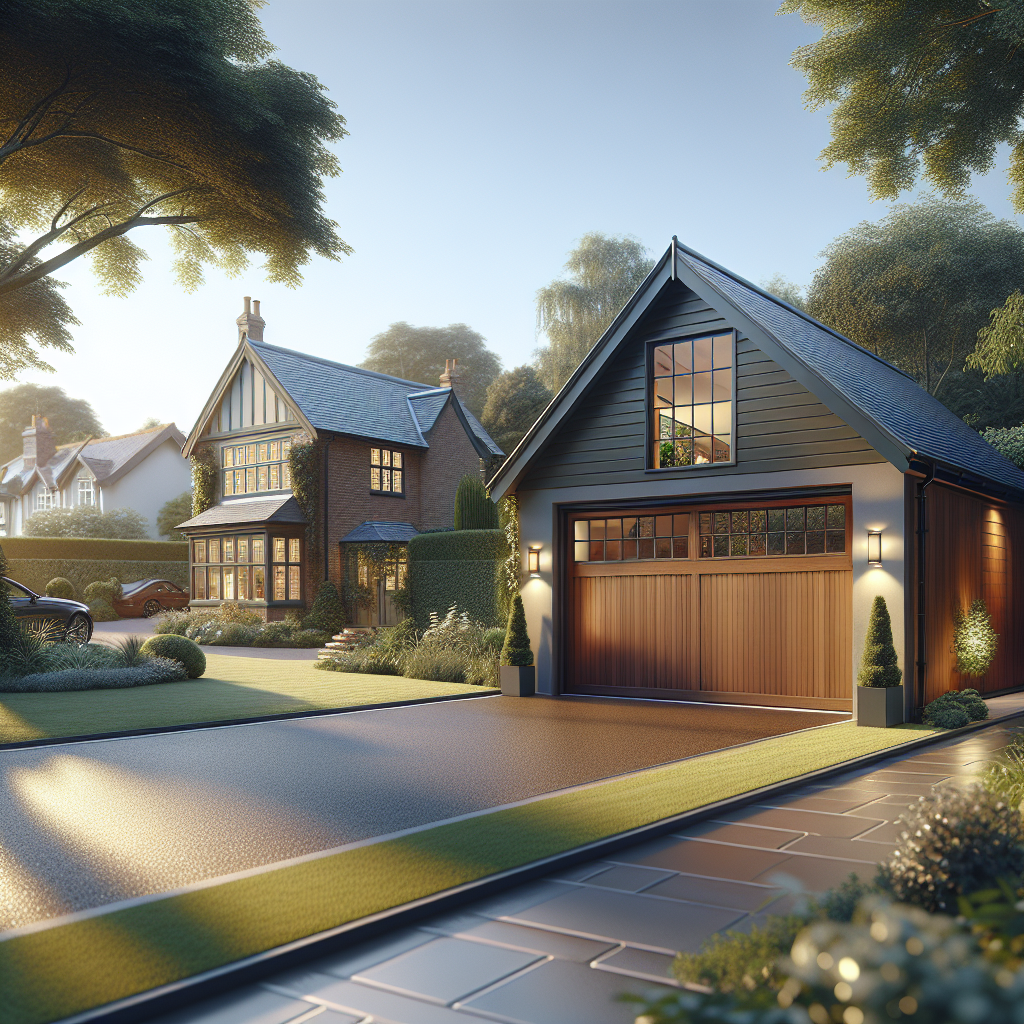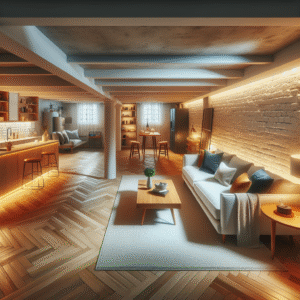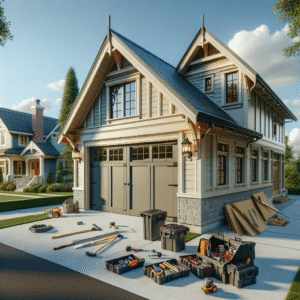Welcome to our latest blog post where we delve into the exciting world of building your own detached garage! Whether you’re looking to add extra storage space, secure your vehicles, or create a new workshop, understanding the ins and outs of zoning laws, building permits, and effective design for detached garages is crucial. This guide, brought to you by BuildNet, aims to simplify these processes and help you make informed decisions as you embark on your garage building project.
Understanding Zoning Laws and Building Permits for Detached Garages
Navigating the maze of zoning laws and securing the right building permits can be daunting. Local zoning laws dictate where a garage can be located on your property, how large it can be, and sometimes even what materials you can use. Building permits ensure that your garage plans are safe and comply with local construction standards. We’ll provide a detailed overview of how to handle these requirements smoothly and efficiently.
Essential Design Considerations and Material Selection for Detached Garages
Designing a detached garage involves more than just deciding on the size and location. It’s about creating a structure that not only meets your needs but also complements your home’s aesthetic. Key factors include choosing the right materials, planning for enough storage, and considering future usability. We’ll guide you through the best practices in design and material selection to maximize functionality and curb appeal.
Cost Estimation and Hiring the Right Contractor for Your Detached Garage Project
Estimating the cost of building a detached garage can vary widely based on size, materials, and local labor rates. It’s important to prepare a realistic budget and stick to it. Equally important is choosing the right contractor. We’ll offer tips on getting accurate estimates and selecting a reliable contractor who can bring your vision to fruition without unnecessary delays or costs.
By following our guide, you’ll be well on your way to adding a practical and beautiful detached garage to your property, increasing both its value and functionality. Stay tuned as we break down each of these topics to help you navigate your detached garage project with confidence!

If you’re ready to take your home improvement or construction project to the next level, we can help! Find trusted contractors on BuildNet, whether you’re looking for renovations, new builds, electrical work, plumbing, or anything in between. Our directory connects you with qualified professionals who can make your vision a reality.
Understanding Zoning Laws and Building Permits for Detached Garages
Hey there! Are you thinking about adding a detached garage to your property? It’s an exciting move that can not only increase your storage space but potentially boost your property’s value as well. However, before you start picking out paint colors or fantasizing about that new workshop, there’s something crucial you need to handle first: understanding zoning laws and navigating the maze of building permits. Don’t worry, though—I’m here to guide you through it!
What Are Zoning Laws?
Zoning laws are regulations established by local governments. They dictate how a property can be used and what structures can be built on it. These laws help to organize urban areas and keep cities functional and livable. When it comes to building a detached garage, these laws will determine where you can build it, how large it can be, and sometimes even what materials you can use.
Why Do Zoning Laws Matter for Your Detached Garage?
Ignoring zoning laws can lead to some serious headaches. At best, you might be fined. At worst, you might be forced to tear down your new garage! That’s why it’s crucial to know what’s allowed in your area:
- Setback Requirements: These rules define how close your garage can be to property lines. Ensuring your garage is properly placed according to these limitations is crucial.
- Size Limitations: Some zones restrict the height and overall square footage of detached garages.
- Aesthetic Guidelines: In some neighborhoods, especially those with homeowner’s associations, there might be requirements regarding the appearance of outbuildings.
Understanding these constraints ahead of time can save you from costly mistakes and do-overs.
How to Check Local Zoning Laws
Now, you might be wondering, “How do I find out what these laws are?” Here’s how you can get started:
- Talk to Your Local Building Authority: Visit your city or county’s building department. They can provide detailed information about the specific zoning regulations for your property.
- Consult a Professional: Consider hiring a local land use attorney or a professional planner. They can offer detailed insights and help navigate complex zoning requirements.
- Online Resources: Some local governments have zoning information available on their websites. This can be a quick way to start your research from the comfort of your home.
Obtaining the Right Building Permit
Once you understand your local zoning laws, the next step is obtaining a building permit. This is a must-have before you start construction, as it ensures your project complies with local building codes, which cover safety issues and standards for construction practices.
Why You Need a Building Permit
Getting a building permit might seem like just another bureaucracy hoop to jump through, but it serves important purposes:
- Safety: Permits ensure that your garage is built safely and meets structural standards.
- Value: A legally permitted garage can increase your property value. Unpermitted work might lead to issues when you decide to sell your home.
- Insurance: If your garage is built without a permit, you might have trouble getting insurance coverage for it.
How to Apply for a Building Permit
Here’s a simplified guide to getting that all-important permit:
- Gather Your Documents: You’ll likely need site plans, construction details, and possibly even your property survey.
- Submit Your Application: Take your documents to the local building department or, in some areas, you might be able to submit your application online.
- Wait for Approval: This can take anywhere from a few days to a few months, depending on your location and the complexity of the project.
Remember, each local area will have its own specific process for applications, so make sure to ask your building department for detailed instructions.
Utilize Local Expertise
If all of this sounds daunting, don’t hesitate to call in the experts. Local contractors are not only familiar with building requirements but often have a rapport with those in the local building departments. They can help smooth the way for your permit application and ensure that your detached garage meets all legal requirements. Plus, they understand the local market and can advise on the best practices for adding value to your home.
So, ready to move forward with your detached garage? Great! A little bit of homework on zoning laws and permits at the start can lead to a successful project completed without legal hitches or compliance hassles. Happy building!

Essential Design Considerations and Material Selection for Detached Garages
So, you’re thinking about adding a detached garage to your property? That’s a fantastic idea! Not only does it add value to your home, but it also provides additional space for your vehicles, tools, and potentially a new hobby area. Let’s dive into some of the essential design considerations and material selections that will help turn your vision into reality.
Designing Your Dream Detached Garage
First things first, the design of your detached garage should seamlessly complement your existing home architecture while also fulfilling your functional needs. Here are a few tips to get you started:
- Size and Layout: Start by determining how much space you’ll need. Are you looking for just enough room for a couple of cars, or are you hoping to include a workshop or storage area? Typically, a standard two-car garage requires about 24 by 24 feet. Plan your layout carefully to maximize your usage of the space.
- Roofing Style: The roof of your garage affects not just aesthetics but also practicality. Gable roofs are popular for their traditional look and effective water drainage, while flat roofs can be perfect if you’re considering a future roof-top deck.
- Windows and Lighting: Natural light can make your garage a more pleasant place to work. Consider placing windows or skylights strategically to maximize light and ventilation without compromising on insulation.
- Door Types: The garage door is often the most noticeable feature. Choose a style that matches your home’s character. Carriage doors offer a charming, old-world feel, whereas modern roll-up doors are sleek and functional.
Choosing the Right Materials
The materials you choose for your garage not only influence how it looks but also how it performs in terms of insulation, maintenance, and durability. Here are some top considerations:
- Building Materials: Wood, steel, and concrete blocks are among the most common. Wood offers a classic appeal and easy customization but requires maintenance against decay and pests. Steel garages are durable and offer great resistance to fire, while concrete blocks are excellent for insulation and can withstand severe weather conditions.
- Insulation: This is critical if you plan to spend a lot of time in your garage or intend to store temperature-sensitive items. Consider using fiberglass or foam board insulation to keep your garage comfortable year-round.
- Flooring: Concrete is the most popular garage flooring material due to its durability and ease of maintenance. Epoxy treatments can add a layer of protection against stains, grease, and moisture while also enhancing the look of the floor.
- Exterior Finishes: The exterior should ideally match or complement your home’s design. Stucco, vinyl siding, and brick are common choices that offer both aesthetic appeal and protective benefits.
Smart Features and Modern Upgrades
Incorporating technology and modern features can enhance the functionality of your detached garage. Here are some nifty upgrades to consider:
- Smart Garage Door Openers: These can be controlled via your smartphone and often include features like built-in cameras and intercoms for added security.
- Energy-Efficient Lighting: LED lighting fixtures provide bright, energy-efficient light that’s perfect for a garage environment.
- Heating and Cooling Systems: If you’re planning to use the garage as a workshop, consider installing a climate control system to keep the space comfortable in all seasons.
- Electrical and Plumbing: If you think you’ll need water supply or a hefty amount of electrical outlets, it’s best to include these in your initial plan.
Designing and building a detached garage is a significant but rewarding project. By considering these essential design elements and material choices, you are on your way to creating not just a building, but a functional and appealing addition to your home. Remember, the key lies in careful planning and not skimping on quality. Happy building!
Cost Estimation and Hiring the Right Contractor for Your Detached Garage Project
Planning to build a detached garage? That’s exciting! But before you start envisioning turning the key in your new garage door, you’ll need to nail down your budget and find the right contractor to bring your plans to life. Let’s dive into the essentials of cost estimation and tips on hiring the perfect professional for your detached garage project.
Breaking Down the Costs
Understanding the budget required for constructing a detached garage is crucial. Costs can vary widely based on size, materials, and custom features. Here’s a simple breakdown to help you get a handle on your budget:
- Foundation and Framing: Typically, this is one of the most significant portions of your budget. Depending on the ground conditions and the size of the garage, costs can vary.
- Roofing and Siding: Choose materials that match your home to ensure your new garage isn’t just functional but also an aesthetic addition to your property.
- Electrical and Plumbing: If you plan to use the garage as a workshop or want to include a laundry space, budget for electrical and plumbing costs.
- Interior and Exterior Finishes: These elements can transform the basic structure into a polished space. Think about what finishes will provide the most benefit for your needs.
Don’t forget to factor in permits and inspections, which can vary by locality but are crucial for ensuring your garage is up to code and legally compliant.
Getting a Detailed Estimate
Once you have a rough idea of what you want, it’s time to get a detailed estimate. Reach out to several local contractors to get a comprehensive quote. Make sure these estimates include every aspect of the construction:
- Material costs
- Labor costs
- Permit fees
- Timeline for completion
- Any potential extra costs (such as groundwork improvement)
Comparing these details from different contractors can provide insight into market rates and help you identify a reasonably priced, yet quality-oriented professional.
Finding the Right Contractor
Choosing the right contractor is arguably the most crucial step in your detached garage project. Here’s how you can find a reliable professional:
Check Local Listings and Reviews
Start your search by checking out listings on a dedicated local contracting and home service directory like BuildNet. Reviews and ratings from previous clients can be incredibly telling.
Verify Credentials
Ensure any contractor you consider is licensed, insured, and bonded. This protects you against possible damages or subpar work, and verifies that they have met the professional standards required by your local jurisdiction.
Interview Potential Contractors
Once you’ve narrowed down your list, set up meetings to discuss your project in detail. Use this opportunity to gauge their communication style, professionalism, and dedication. Ask about:
- Past projects
- Experience with detached garages
- Their project management process
- How they handle unexpected issues
These discussions can provide deep insights into whether they’re the right fit for your project.
Get Everything in Writing
Once you decide on a contractor, ensure all details are documented in a clear, concise contract. This should include payment schedules, the project timeline, and detailed specifications of the work to be done. A well-documented contract can help prevent disputes and ensure a smooth project flow.
Ready to Start?
Armed with a solid cost estimation and a reliable contractor, you’re now ready to kickstart your detached garage project. Remember, thorough planning and the right professional help can transform your vision into reality smoothly and efficiently. Here’s to a successful build and the many benefits your new garage will bring!

What are zoning laws and how do they impact the construction of a detached garage?
Zoning laws are regulations governing the use of land and the buildings on it. When planning to build a detached garage, these laws determine factors like how close structures can be to property lines, the maximum building height, and the percentage of land that can be covered by buildings. Always check with your local zoning office to ensure your garage project complies with these laws to avoid any legal issues or costly adjustments down the line.
What types of building permits might I need for a detached garage?
Building permits are crucial for ensuring that your detached garage meets local building codes and safety standards. Typically, you’ll need a general construction permit, and depending on the specifics of your project, you might also require electrical, plumbing, or mechanical permits. The process involves submitting your building plans for approval before construction begins. It’s highly advisable to contact your local building department for detailed guidance.
What are the essential design considerations for a detached garage?
When designing a detached garage, consider its intended use. Will it just be for vehicle storage, or do you plan on using it as a workshop or hobby area? Key considerations include the size and number of vehicles, the need for storage space, electrical and insulation requirements, and whether you want windows for natural light. Also, think about the future; you might want to design the space so it can be easily adapted for different uses later on.
How do I choose the right materials for building a detached garage?
Material selection is pivotal for both the longevity and functionality of your garage. Common choices include wood, steel, and concrete blocks. Each material has its strengths and weaknesses concerning durability, maintenance, insulation, and cost. Your local climate and budget will largely influence this decision, so consider what material best matches your needs and environment.
How can I estimate the costs for building a detached garage?
Cost estimation should include materials, labor, permits, and any unforeseen expenses. Start by listing all components like foundation, framing, roofing, electrical, and finishing. Contact local suppliers for material costs and consult with contractors for labor estimates. For a more detailed and accurate budget, consider using cost estimation software or consulting with a professional estimator.
What should I look for when hiring a contractor for my detached garage project?
Choosing the right contractor is crucial. Look for someone with experience in building detached garages. Check their credentials, insurance, and references. It’s also wise to review their past projects and customer feedback. Make sure you get a detailed contract that outlines the scope, timeline, costs, and payment terms to avoid any misunderstandings.
Can I build a detached garage myself or should I hire a professional?
Building a garage can be a rewarding project, but it requires skills in carpentry, roofing, and possibly plumbing and electrical work, depending on the complexity. If you have the expertise, tools, and time, DIY could save you money. However, hiring professionals ensures that the work is up to code, efficiently done, and typically comes with warranties. When in doubt, it’s safer and more prudent to hire skilled contractors.
Conclusion
Building a detached garage is a fantastic way to add value to your property and enhance your living space. Whether you’re planning a simple car storage or a multi-functional workshop, understanding the ins and outs of zoning laws, design considerations, and material selection is crucial. Remember, accurate cost estimation and selecting the right contractor can make or break your project. If you’re unsure about any step along the way, don’t hesitate to reach out for professional advice. You can always find reliable and skilled contractors on the BuildNet website. They’re ready to help bring your garage project to life and provide you with a free quote. So why wait? Start planning your dream garage today!







